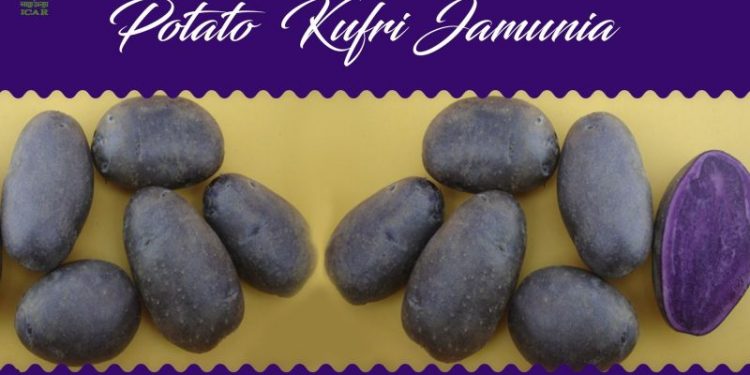New Varieties Offer High Yields, Climate Resilience, and Nutritional Benefits
Prime Minister Narendra Modi has recently introduced three groundbreaking potato varieties at the India Agricultural Research Institute. These new varieties—Kufri Chipsona-5, Kufri Bhaskar, and Kufri Jamunia—represent a significant advancement in Indian agriculture, offering enhanced yield, climate resilience, and biofortification.
Kufri Jamunia: The Purple-Fleshed Nutritional Powerhouse
The Kufri Jamunia variety is India’s first purple-fleshed potato, distinguished by its high yield, exceptional storability, and biofortified benefits. This medium-maturing variety, which takes approximately 90 days to mature, is rich in anthocyanins, potent antioxidants found in its vibrant purple flesh. With a potential yield of 32-35 tonnes per hectare, Kufri Jamunia features dark purple tubers that are oblong with shallow eyes. It is highly recommended for the Northern, Central, and Eastern plains of India due to its excellent storability under ambient conditions.
Kufri Chipsona-5: A Versatile Choice for Chip Production
Kufri Chipsona-5 is designed specifically for the chip production industry, addressing the low share of Indian potato production in this sector. This variety matures in 90-100 days and produces white-cream oval tubers with a creamy flesh and mealy texture. It is resistant to late blight, a common disease affecting potato plants, which helps maintain plant health and yield. Kufri Chipsona-5 is suitable for the North Indian plains and similar agro-ecologies, boasting good keeping quality and moderate tuber dry matter with low reducing sugar.
Kufri Bhaskar: Versatility for Northern and Central Plains
The Kufri Bhaskar variety is tailored for cultivation in Northern and Central plains. It is a medium-maturing potato with white-cream, ovoid tubers that have shallow eyes and a mealy texture. Kufri Bhaskar is resistant to hopper and mite infestations, which contributes to better plant health and improved yields. It allows for early planting, optimizing crop schedules and rotations effectively.
These innovative varieties, developed by CPRI scientists, aim to address both processing industry demands and climate challenges, marking a significant step forward in India’s potato agriculture.







